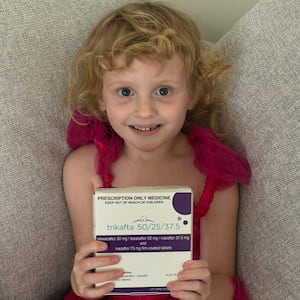Health
Kiwi Family Relocates to Australia for Life-Saving CF Drug

A family from Lower Hutt, New Zealand, has relocated to Australia to secure access to a vital medication for their daughter suffering from cystic fibrosis (CF). The four-year-old girl requires Trikafta, a drug that has been described as a significant advancement in the treatment of CF. While it does not cure the condition, Trikafta targets its underlying causes rather than merely alleviating symptoms, potentially extending life expectancy by decades.
The move was driven by the urgent need to prevent further irreversible damage to their daughter’s health. Kayla Delaney, her mother, expressed the profound impact of the diagnosis, noting that the news of her newborn’s CF was “devastating.” Early estimates from New Zealand indicated that the average life expectancy for individuals with CF is only 31 years, highlighting the critical importance of effective treatment.
Access Challenges and Medication Costs
Currently, Trikafta is not funded in New Zealand for children aged 2 to 6. According to Pharmac, the agency responsible for subsidizing medications, an application to fund the drug for this age group is under assessment. As of now, there is no indication of when a decision might be made. The out-of-pocket cost for Trikafta in New Zealand is approximately $330,000 per year, excluding GST. This financial burden makes it unfeasible for many families, prompting some to seek treatment options abroad.
Cystic fibrosis is a genetic disorder that leads to the production of thick, sticky mucus, which primarily obstructs the lungs and pancreas. Patients with CF face increased risks of lung damage, recurrent infections, and digestive complications. The urgency of this situation is underscored by the personal struggles of families navigating the healthcare system in search of life-saving treatments.
The Impact of Trikafta on Cystic Fibrosis Treatment
Trikafta is considered a transformative therapy for many individuals with cystic fibrosis. Users have reported significant improvements in lung function and overall health. It represents a shift in the treatment paradigm, focusing on correcting the underlying defect in the CF gene rather than just managing symptoms. As families like the Delaneys embark on difficult decisions to ensure their children’s health, the hope is that access to such medications will become more equitable and widespread.
The challenges faced by the Delaney family are emblematic of a broader issue affecting families dealing with chronic health conditions in New Zealand. The ongoing discussion surrounding the accessibility of life-saving medications continues, highlighting the need for systemic changes to ensure that all patients have the opportunity to benefit from medical advancements.
In the meantime, Kayla Delaney’s family is focused on their new life in Australia, where they can access the treatment essential for their daughter’s well-being. The emotional journey of navigating this transition exemplifies the lengths to which families will go for the sake of health and hope.
-

 Sports1 month ago
Sports1 month agoNetball New Zealand Stands Down Dame Noeline Taurua for Series
-

 Entertainment1 month ago
Entertainment1 month agoTributes Pour In for Lachlan Rofe, Reality Star, Dead at 47
-

 Entertainment1 week ago
Entertainment1 week agoNew ‘Maverick’ Chaser Joins Beat the Chasers Season Finale
-

 Sports1 month ago
Sports1 month agoSilver Ferns Legend Laura Langman Criticizes Team’s Attitude
-

 Entertainment2 months ago
Entertainment2 months agoKhloe Kardashian Embraces Innovative Stem Cell Therapy in Mexico
-

 Sports2 months ago
Sports2 months agoGaël Monfils Set to Defend ASB Classic Title in January 2026
-

 World3 months ago
World3 months agoPolice Arrest Multiple Individuals During Funeral for Zain Taikato-Fox
-

 Politics2 weeks ago
Politics2 weeks agoNetball NZ Calls for Respect Amid Dame Taurua’s Standoff
-

 Entertainment3 weeks ago
Entertainment3 weeks agoTyson Fury’s Daughter Venezuela Gets Engaged at Birthday Bash
-

 Sports3 weeks ago
Sports3 weeks agoHeather McMahan Steps Down as Ryder Cup Host After Controversy
-

 Entertainment3 weeks ago
Entertainment3 weeks agoTyson Fury’s Daughter Venezuela Gets Engaged at Birthday Bash
-

 World3 weeks ago
World3 weeks agoNew Zealand Firefighters Plan Strike on October 17 Over Pay Disputes


















